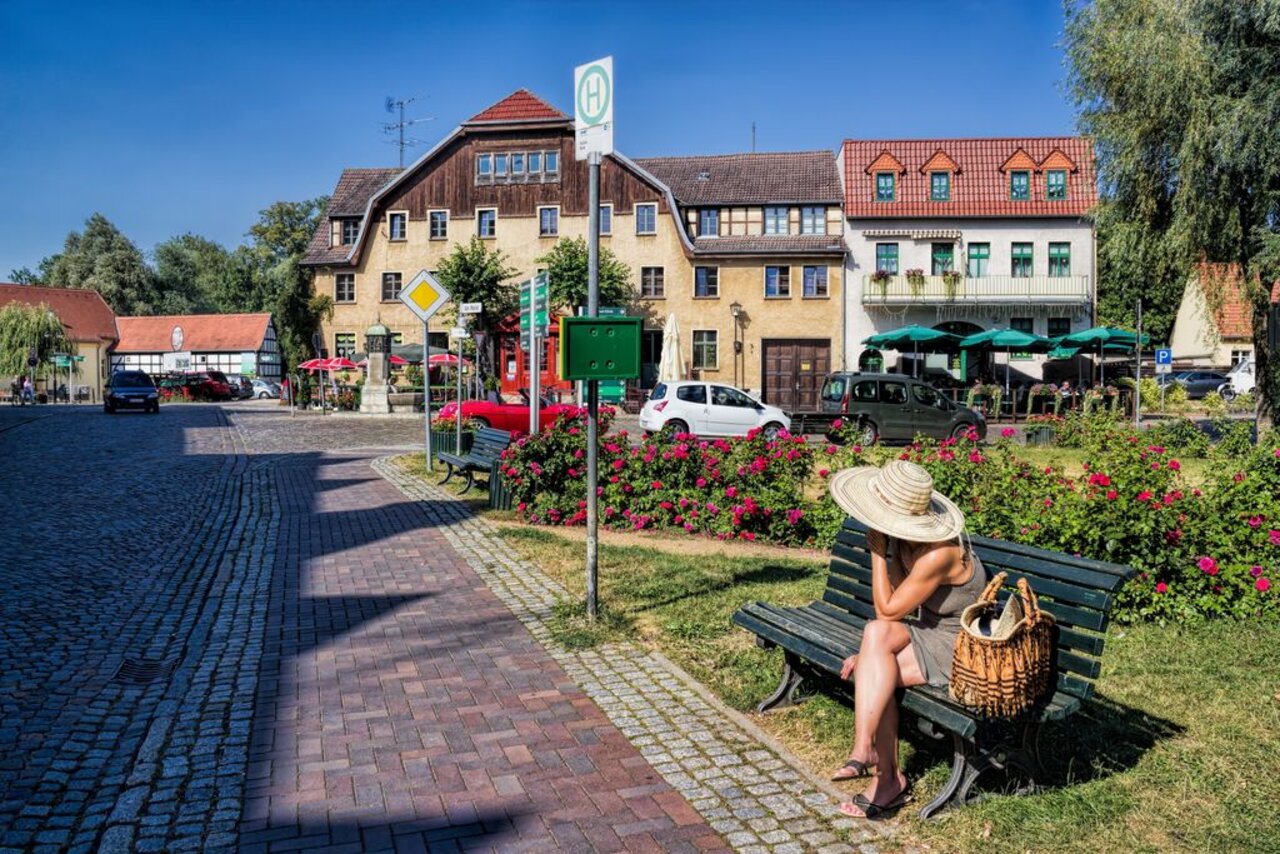Project
"Feelings of Being Left Behind" in Rural Areas?

In the public and political discussion, rural areas are depicted very differently. Partly they are regarded as economically prosperous places with a high living quality, partly as regions which “are left behind”. This research project examined how the population of rural regions perceives the situation on site and how the population relates to politics.
Background and Objective
In the 2017 federal elections, the Alternative for Germany (AfD) was the first right-wing populist party to enter the German parliament. At the time, the AfD achieved a second vote result of 12.6%. In the 2021 federal election, it was re-elected to the Bundestag with 10.3%.
The AfD's youth organization and the now dissolved internal party group "Flügel" have for some time now been under observation by the Federal Office for the Protection of the Constitution as suspected right-wing extremists. Several of the party's state associations are also under observation by the constitution protection authorities as suspected cases of right-wing extremism and the Thuringian state association is considered to be "definitely right-wing extremist".
The AfD's electoral successes have been interpreted in the public debate as an indicator of dissatisfaction and also as an expression of "feelings of being left behind".
In the research project "Feelings of being left behind" in rural areas? we studied what the public understands by "being left behind"; whether the AfD is actually particularly successful in rural areas and how people in rural areas perceive and interpret the situation.
Approach
The project first analyzed the popular media debate on the "feelings of being left behind" in a qualitative discourse analysis and traced various media representations and perceptions of "being left behind".
Subsequently, the election results of the 2017 federal election were examined with regard to the connection between rurality and second vote shares for the Alternative for Germany (AfD) party.
Following on from the results of the election analysis, ten different rural regions were selected, in each of which a group discussion was conducted. In the group discussions, general questions were asked about living conditions and (dis)satisfaction in rural areas as well as specific questions about the possible responsibilities of political actors.
Data and Methods
- Grounded Theory
- qualitative discourse analysis of newspaper articles
- quantitative analysis of electoral and structural data
- qualitative analysis of group discussions
Our Research Questions
- What is meant by "being left behind" in popular media discourse?
- Is the AfD really particularly successful in rural areas?
- How do people in rural areas perceive the situation, how satisfied are they with life there, what dissatisfaction prevails and who do they blame for this?
Results
Three levels of meaning or narratives of "being left behind" were identified in the discourse analysis:
infrastructural: as a result of a thinning out of services of general interest
economic: as a result of unemployment or a region's less favorable economic situation
cultural: as a result of a change in social values towards cosmopolitan, modern attitudes.
All these narratives have in common that the so-called "left behind" feel that their fears and concerns are not being taken seriously by the ruling parties.
The results of the quantitative analysis of the election results of the 2017 Bundestag election show that the AfD achieved the highest election results in eastern Germany, particularly in more rural communities, while in western Germany these were at the same level in more rural and non-rural communities. In both western and eastern Germany, very rural municipalities usually had lower AfD election results in 2017 compared to the more rural municipalities. This changed in western Germany in 2021, when the AfD performed slightly better in very rural municipalities. As a result, the thesis that people in rural areas are more likely to vote for the AfD must be rejected in its generalized form. A differentiated analysis of rural areas is necessary.
The analysis of the group discussion showed that a high level of satisfaction with local living conditions prevails in structurally strong rural areas and that the AfD is less popular there despite a locally dominant right-wing conservative culture. Dissatisfaction in (rather) structurally weak rural areas only went hand in hand with high AfD election results when a right-wing conservative political culture dominated locally. The AfD was less popular in structurally weak areas, even if there was strong dissatisfaction with the infrastructure, if a left-liberal political culture prevailed locally.
Overall, an interweaving of infrastructural, cultural and economic factors could be seen in the population's perception and interpretation processes.
The simple equation that people in rural areas feel "left behind" does not work. For this reason, policies that rely solely on infrastructure measures to bring about a decline in right-wing populist and, in some cases, right-wing extremist tendencies do not appear very promising.
Links and Downloads
Project: Poverty and Social Integration in Rural Areas
Project: Stability and Acceptance of the Democratic System in Rural Areas
Thünen-Contact

Involved Thünen-Partners
Duration
4.2018 - 3.2023
More Information
Project status:
finished
Publications to the project
- 0
Deppisch L (2025) „Wir sind nur Menschen zweiter Klasse“ : vom Abbau der Daseinsvorsorge und Aufstieg des Rechtspopulismus. Aus Politik Zeitgesch 75(10-11):45-53
- 1
Klärner A (2024) In Krisenzeiten zusammenhalten. LandInForm(4):12-13
- 2
Maurin J, Klärner A (2024) „Die ländlichen Räume sind nicht abgehängt“ [Interview] [online]. TAZ, zu finden in <https://taz.de/Soziologe-ueber-Stadt-Land-Gegensatz/!6043527/> [zitiert am 14.11.2024]
- 3
Klärner A, Lehmann N (2024) „Es gibt kein ländliches Elend“ [Interview]. Agrarheute(10):27-29
- 4
Deppisch L, Osigus T, Klärner A (2023) "Gefühle des Abgehängtseins" in ländlichen Räumen? Braunschweig: Thünen-Institut für Lebensverhältnisse in ländlichen Räumen, 2 p, Project Brief Thünen Inst 2023/38, DOI:10.3220/PB1693809389000
- 5
Deppisch L, Osigus T, Klärner A (2023) 'Feelings of being left behind' in rural areas? Braunschweig: Thünen Institute of Rural Studies, 2 p, Project Brief Thünen Inst 2023/38a, DOI:10.3220/PB1697437590000
- 6
Deppisch L (2022) Book review: Rechtes Denken, rechte Räume? Demokratiefeindliche Entwicklungen und ihre räumlichen Kontexte. Geogr Helv 77(1):123-125, DOI:10.5194/gh-77-123-2022
- 7
Deppisch L (2022) Die AfD und das "Dornröschenschloss" - über die (Be-)Deutung von Peripherisierung für den Rechtspopulismuszuspruch. Sozial- und Kulturgeographie 48:103-121
- 8
Deppisch L, Osigus T, Klärner A (2022) How rural is rural populism? On the spatial understanding of rurality for analyses of right-wing populist election success in Germany. Rural Sociol 87(S1):692-714, DOI:10.1111/ruso.12397
- 9
Deppisch L, Klärner A (2021) "Gefühle des Abgehängtseins" in ländlichen Räumen? Ein multimethodisches Forschungsprojekt am Thünen-Institut für Ländliche Räume, Braunschweig. Z Agrargeschichte Agrarsoziologie 69(1):85-89
- 10
Deppisch L (2021) "Where people in the countryside feel left behind populism has a clear path" - an analysis of the popular media discourse on how infrastructure decay, fear of social decline, and right-wing (extremist) values contribute to support for right-wing populism. Braunschweig: Johann Heinrich von Thünen-Institut, 79 p, Thünen Working Paper 119a, DOI:10.3220/WP1613460042000
- 11
Deppisch L (2021) Krajewski, C.; Wiegandt, C.-C. (Hrsg.) (2020): Land in Sicht. Ländliche Räume in Deutschland zwischen Prosperität und Peripherisierung [Rezension]. Raumforsch Raumordn Spat Res Plann 79(5):536-537, DOI:10.14512/rur.109
- 12
Deppisch L, Klärner A (2021) Was heißt eigentlich "abgehängt"? Wochenbl Landwirtsch Landleben(11):15
- 13
Deppisch L (2020) "Gefühle des Abgehängtseins" - ein Angstdiskurs. In: Martin S, Linpinsel T (eds) Angst in Kultur und Politik der Gegenwart : Beiträge zu einer Gesellschaftswissenschaft der Angst. Wiesbaden: Springer VS, pp 179-203, DOI:10.1007/978-3-658-30431-7_10
- 14
Deppisch L, Klärner A, Küpper P, Neumeier S, Osigus T (2020) Von der Erzählung vom "abgehängten ländlichen Raum" : Was uns ein Blick auf Strukturdaten verrät. Akt Analysen 76:40-51
- 15
Deppisch L (2019) "Wo sich Menschen auf dem Land abgehängt fühlen, hat der Populismus freie Bahn" - eine Analyse des populär-medialen Diskurses zu der Bedeutung von Infrastrukturverfall, Abstiegsangst und rechten (extremistischen) Werten für den Zuspruch zum Rechtspopulismus. Braunschweig: Johann Heinrich von Thünen-Institut, 78 p, Thünen Working Paper 119, DOI:10.3220/WP1550668971000
- 16
Deppisch L, Klärner A, Osigus T (2019) Ist die AfD in ländlichen Räumen besonders erfolgreich? Wissen Schafft Demokratie 5:74-87

![[Translate to English:] [Translate to English:]](/media/_processed_/2/0/csm_LV_Bei_Hornburg_Quelle_Johanna_Fick_neu_da89674833.jpg)
![[Translate to English:] [Translate to English:]](/media/_processed_/2/0/csm_LV_Bei_Hornburg_Quelle_Johanna_Fick_neu_3aae309567.jpg)





